Cognitive Behavioral Therapy (CBT) Certification
Cognitive Behavioral Therapy Certification
Cognitive Behavioral Therapy (CBT) has emerged as one of the most effective treatments for a wide range of psychological problems.
By helping a client understand how their thoughts, feelings, and behaviors interact to maintain faulty patterns of thinking, CBT assists them in developing a more constructive approach to problem-solving and life in general.
This course provides a comprehensive overview of the theory underlying CBT, the counseling skills that underpin good therapeutic practice and how to implement specific CBT techniques in the treatment of depression, anxiety, and other common mental health problems.
You Will Learn:
- What is meant by the term “cognitive behavioral therapy” (CBT) and the underlying principles that guide CBT practitioners.
- How counselling works to promote change and the basic counselling skills every therapist needs to develop.
- How to develop listening skills that promote client disclosure and how to communicate empathy.
- How to help clients identify their irrational beliefs and how the ABC model is used to guide CBT.
- How to formulate a case and plan CBT sessions.
- How to select and implement CBT tools such as journaling, behavioral experiments and challenging maladaptive thoughts.
- How to use CBT techniques to help someone overcome depression and resume engagement with day-to-day life.
- How to use CBT techniques to reduce the impact of a client's anxiety, overcome panic attacks and conquer phobias.
- How thoughts, feelings and behaviors cause and maintain insomnia, and how CBT can help a client resume a normal sleeping pattern.
- An overview of two therapies based on CBT – Dialectical Behavioral Therapy (DBT) and Solution-Focused Therapy (SFT) – and the client populations most likely to benefit from them.
Benefits Of Taking This Course
- You will learn how CBT and psychotherapy in general work to alleviate mental distress.
- You will gain insight into a number of common mental health conditions, which is useful for anyone working in, or looking to work in, a caring profession.
- You will discover how faulty cognition and maladaptive behaviors maintain mental distress, which will enable you to help yourself and others adopt more effective coping methods.
- Your knowledge will give you the confidence to decide whether a career as a CBT therapist is right for you.
- You can study from any location with an internet connection.
- Learn the material at any time and at your own pace.
- Lifetime access to the course – no deadlines.
This course includes
24/7 Student Support
End of course certification
Lifetime access to your course
Compatible with modern devices
- A brief overview of what is meant by the term “CBT”
- An overview of the most common counselling approaches in modern therapy
- The context of CBT, including the research and psychological approaches underlying CBT
- The interplay of thoughts, emotions and actions as conceptualized by CBT practitioners
- Why basic counseling skills are the foundation of good practice, regardless of the therapeutic approach used
- The role of the therapeutic alliance and how it differs from friendships and other professional relationships
- Why therapists must maintain appropriate boundaries between themselves and a patient and the consequences of poor boundary-setting
- The importance of listening and the differences between passive and active listening
- Why therapy is most effective when a therapist is in a state of congruence
- How to demonstrate congruent behavior
- How to empathize with a patient’s difficulties and position
- What is meant by an ethical code and how they are used to guide the therapy process
- How to conduct a patient consultation and formulate a case
- The components of a good case formulation and how it should be used to guide a therapist’s choice of techniques
- How the ABC model can be used to help a patient understand how their beliefs are maintaining their state of distress
- How to help a patient identify their irrational beliefs
- Why you need to understand the components that make up an effective CBT session
- Material that should be addressed within the first few minutes of a session
- How to review homework and provide constructive feedback
- How to set and implement a suitable agenda for the session
- How to help a patient challenge their negative thoughts using thought records and diaries
- The most common cognitive distortions seen in CBT practice
- How to help a patient overcome resistance with regards to changing their thoughts
- The STOPP technique and how it can help a patient live with negative thoughts
- How behavioral experiments can be used to challenge a patient’s thoughts and feelings
- The various types of behavioral experiments used to help patients address their fears and overcome maladaptive thoughts
- How exposure and response prevention techniques can help a patient overcome compulsive behaviors
- Why encouraging a patient to imagine the worst-case scenario can help lower their CBT is currently the type of talking treatment most commonly off anxiety levels
- The symptoms of depression and why it is the most commonly seen problem in contemporary CBT practice
- The typical thought patterns that present in cases of depression and how these cognitive distortions affect a patient’s feelings and behaviors
- Why people with depression have problems enjoying activities and how CBT can help them re-engage with life
- The various types of anxiety disorders and how a patient’s thoughts, feelings and behaviors can maintain the symptoms
- The signs of pathological anger and why it warrants careful management
- What happens in the body when someone experiences extreme anger and why it is useful to explain this process to a patient
- The thoughts, feelings and behaviors underlying pathological anger
- How to help a patient challenge their thoughts, feelings and behavior to reduce their anger
- How early CBT paradigms laid the basis for other variations now in popular use
- An overview of Dialectical Behavior Therapy (DBT) and its key indications
- The specific skills and techniques a therapist needs to implement DBT
- An overview of Solution Focussed Brief Therapy (SFBT) and how it can be used to trigger positive change in patients
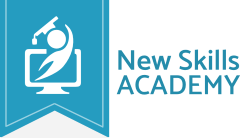 ID: YDFT67YHJ
ID: YDFT67YHJ
of achievement
This certificate is presented to
Your Name

For completing the
Cognitive Behavioral Therapy (CBT) Certification
on 21st November 2025
Selena Hurford
Selena Hurford
Course Tutor

Daniel Morgan
Daniel Morgan
Head of Academy
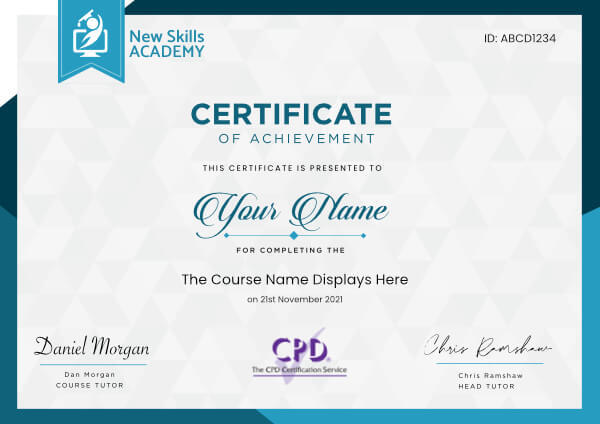
Anyone who has an interest in learning more about this subject matter is encouraged to take the course. There are no entry requirements to take the course.
The course is broken down into 10 individual modules. Each module takes between 20 and 90 minutes on average to study. Although you are free to spend as much or as little time as you feel necessary on each module, simply log in and out of the course at your convenience.
You can study the course any time you like. Simply log in and out of the web based course as often as you require. The course is compatible with all computers, tablet devices and smart phones so you can even study while on the move!
Once you have completed all 10 modules there is a multiple choice test. The questions will be on a range of topics found within the 10 modules. The test, like the course, is online and can be taken a time and location of your choosing.
The pass mark for the test is 70%.
If you don’t pass the test first time you will get further opportunities to take the test again after extra study. There are no limits to the number of times you can take the test. All test retakes are included within the price of the course.
You can either use your Visa, MasterCard, American Express, Solo cards or PayPal account to pay for the online course. Our site uses the latest SSL encryption to ensure your safety. All payments are handled securely by PayPal.
You can begin the course immediately after your payment has been received. You will create your login details during the checkout process. We will also send you an email confirming your login details.
We estimate that the course will take about 14 hours to complete in total, plus an additional 30 minutes for the end of course test.
Once you have been awarded your certificate it is valid for life. The certificate does not expire or need renewing.
 I am very thankful for this course and to the academy. I have learned a lot from it and I was able to apply it to my clients. I hope I can take more courses and I strongly recommend them to aspiring therapists. Alvin Joseph Fernandez
I am very thankful for this course and to the academy. I have learned a lot from it and I was able to apply it to my clients. I hope I can take more courses and I strongly recommend them to aspiring therapists. Alvin Joseph Fernandez
 I'm really excited about this CBT course! The toolbox is great, everything is well-structured and clear. That is a new level of professional navigation on top of my psychological education background. Thanks! Anna Degtiarova
I'm really excited about this CBT course! The toolbox is great, everything is well-structured and clear. That is a new level of professional navigation on top of my psychological education background. Thanks! Anna Degtiarova
Cognitive Behavioral Therapy Certification
Cognitive Behavioral Therapy (CBT) has emerged as one of the most effective treatments for a wide range of psychological problems.
By helping a client understand how their thoughts, feelings, and behaviors interact to maintain faulty patterns of thinking, CBT assists them in developing a more constructive approach to problem-solving and life in general.
This course provides a comprehensive overview of the theory underlying CBT, the counseling skills that underpin good therapeutic practice and how to implement specific CBT techniques in the treatment of depression, anxiety, and other common mental health problems.
You Will Learn:
- What is meant by the term “cognitive behavioral therapy” (CBT) and the underlying principles that guide CBT practitioners.
- How counselling works to promote change and the basic counselling skills every therapist needs to develop.
- How to develop listening skills that promote client disclosure and how to communicate empathy.
- How to help clients identify their irrational beliefs and how the ABC model is used to guide CBT.
- How to formulate a case and plan CBT sessions.
- How to select and implement CBT tools such as journaling, behavioral experiments and challenging maladaptive thoughts.
- How to use CBT techniques to help someone overcome depression and resume engagement with day-to-day life.
- How to use CBT techniques to reduce the impact of a client's anxiety, overcome panic attacks and conquer phobias.
- How thoughts, feelings and behaviors cause and maintain insomnia, and how CBT can help a client resume a normal sleeping pattern.
- An overview of two therapies based on CBT – Dialectical Behavioral Therapy (DBT) and Solution-Focused Therapy (SFT) – and the client populations most likely to benefit from them.
Benefits Of Taking This Course
- You will learn how CBT and psychotherapy in general work to alleviate mental distress.
- You will gain insight into a number of common mental health conditions, which is useful for anyone working in, or looking to work in, a caring profession.
- You will discover how faulty cognition and maladaptive behaviors maintain mental distress, which will enable you to help yourself and others adopt more effective coping methods.
- Your knowledge will give you the confidence to decide whether a career as a CBT therapist is right for you.
- You can study from any location with an internet connection.
- Learn the material at any time and at your own pace.
- Lifetime access to the course – no deadlines.
This course includes
24/7 Student Support
End of course certification
Lifetime access to your course
Compatible with modern devices
- A brief overview of what is meant by the term “CBT”
- An overview of the most common counselling approaches in modern therapy
- The context of CBT, including the research and psychological approaches underlying CBT
- The interplay of thoughts, emotions and actions as conceptualized by CBT practitioners
- Why basic counseling skills are the foundation of good practice, regardless of the therapeutic approach used
- The role of the therapeutic alliance and how it differs from friendships and other professional relationships
- Why therapists must maintain appropriate boundaries between themselves and a patient and the consequences of poor boundary-setting
- The importance of listening and the differences between passive and active listening
- Why therapy is most effective when a therapist is in a state of congruence
- How to demonstrate congruent behavior
- How to empathize with a patient’s difficulties and position
- What is meant by an ethical code and how they are used to guide the therapy process
- How to conduct a patient consultation and formulate a case
- The components of a good case formulation and how it should be used to guide a therapist’s choice of techniques
- How the ABC model can be used to help a patient understand how their beliefs are maintaining their state of distress
- How to help a patient identify their irrational beliefs
- Why you need to understand the components that make up an effective CBT session
- Material that should be addressed within the first few minutes of a session
- How to review homework and provide constructive feedback
- How to set and implement a suitable agenda for the session
- How to help a patient challenge their negative thoughts using thought records and diaries
- The most common cognitive distortions seen in CBT practice
- How to help a patient overcome resistance with regards to changing their thoughts
- The STOPP technique and how it can help a patient live with negative thoughts
- How behavioral experiments can be used to challenge a patient’s thoughts and feelings
- The various types of behavioral experiments used to help patients address their fears and overcome maladaptive thoughts
- How exposure and response prevention techniques can help a patient overcome compulsive behaviors
- Why encouraging a patient to imagine the worst-case scenario can help lower their CBT is currently the type of talking treatment most commonly off anxiety levels
- The symptoms of depression and why it is the most commonly seen problem in contemporary CBT practice
- The typical thought patterns that present in cases of depression and how these cognitive distortions affect a patient’s feelings and behaviors
- Why people with depression have problems enjoying activities and how CBT can help them re-engage with life
- The various types of anxiety disorders and how a patient’s thoughts, feelings and behaviors can maintain the symptoms
- The signs of pathological anger and why it warrants careful management
- What happens in the body when someone experiences extreme anger and why it is useful to explain this process to a patient
- The thoughts, feelings and behaviors underlying pathological anger
- How to help a patient challenge their thoughts, feelings and behavior to reduce their anger
- How early CBT paradigms laid the basis for other variations now in popular use
- An overview of Dialectical Behavior Therapy (DBT) and its key indications
- The specific skills and techniques a therapist needs to implement DBT
- An overview of Solution Focussed Brief Therapy (SFBT) and how it can be used to trigger positive change in patients
 ID: YDFT67YHJ
ID: YDFT67YHJ
of achievement
This certificate is presented to
Your Name

For completing the
Cognitive Behavioral Therapy (CBT) Certification
on 21st November 2025
Selena Hurford
Selena Hurford
Course Tutor

Daniel Morgan
Daniel Morgan
Head of Academy

Anyone who has an interest in learning more about this subject matter is encouraged to take the course. There are no entry requirements to take the course.
The course is broken down into 10 individual modules. Each module takes between 20 and 90 minutes on average to study. Although you are free to spend as much or as little time as you feel necessary on each module, simply log in and out of the course at your convenience.
You can study the course any time you like. Simply log in and out of the web based course as often as you require. The course is compatible with all computers, tablet devices and smart phones so you can even study while on the move!
Once you have completed all 10 modules there is a multiple choice test. The questions will be on a range of topics found within the 10 modules. The test, like the course, is online and can be taken a time and location of your choosing.
The pass mark for the test is 70%.
If you don’t pass the test first time you will get further opportunities to take the test again after extra study. There are no limits to the number of times you can take the test. All test retakes are included within the price of the course.
You can either use your Visa, MasterCard, American Express, Solo cards or PayPal account to pay for the online course. Our site uses the latest SSL encryption to ensure your safety. All payments are handled securely by PayPal.
You can begin the course immediately after your payment has been received. You will create your login details during the checkout process. We will also send you an email confirming your login details.
We estimate that the course will take about 14 hours to complete in total, plus an additional 30 minutes for the end of course test.
Once you have been awarded your certificate it is valid for life. The certificate does not expire or need renewing.
 I am very thankful for this course and to the academy. I have learned a lot from it and I was able to apply it to my clients. I hope I can take more courses and I strongly recommend them to aspiring therapists. Alvin Joseph Fernandez
I am very thankful for this course and to the academy. I have learned a lot from it and I was able to apply it to my clients. I hope I can take more courses and I strongly recommend them to aspiring therapists. Alvin Joseph Fernandez
 I'm really excited about this CBT course! The toolbox is great, everything is well-structured and clear. That is a new level of professional navigation on top of my psychological education background. Thanks! Anna Degtiarova
I'm really excited about this CBT course! The toolbox is great, everything is well-structured and clear. That is a new level of professional navigation on top of my psychological education background. Thanks! Anna Degtiarova
Why you should study with us
Learn with confidence...

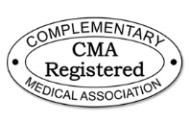

 RRP
$100
RRP
$100
Get a FREE Course
Tick this box to Sign up for our newsletter, and get access to the Interview Skills and CV Writing Certificate course for free! By signing up, you agree to our Privacy Notice & Cookie Policy and to receive marketing and related emails from academy+ brands. You can unsubscribe at any time.What our students say about us...

This course is a great way to brush up on my rusty excel skills, I recommend this course to anyone looking for something to do during lockdown, it's easy to use and talks you through each stage step by step. It has given me the confidence I need to further my career.
Georgia Darke
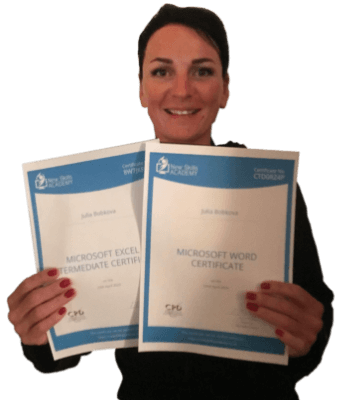
This is a great course for any level of knowledge. Very easy to navigate, great practical tasks and explanations are very clear. You can revise any module with no problem. The test wasn’t too hard if you completed every module. It may be handy to make some notes before you start. Overall I'm very happy with my choice. Thank you New skills for my New skills :)
Julia Bobkova
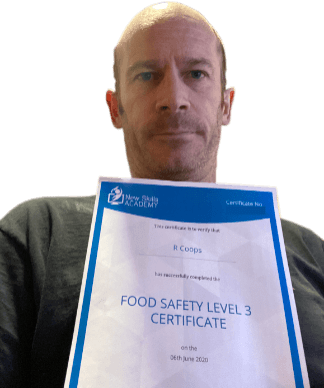
Yet another well laid out course. This is my 3rd course so far with New Skills Academy.
More than likely will be back for another one soon. This course was enjoyable to do, and I learnt a lot and passed first try. My certificate will be up on the wall soon.
Rob Coops

I found this course incredibly useful, as it provided me with practical knowledge which I can implement in my role as a Support Worker. The videos were clear and concise, and the downloadable worksheets reinforced what I had learned as I was able to put pen to paper. Overall, a fantastic course for a great price! I am looking forward to taking on my next one.
Teleisha Harley

I took up this course initially to help me with my own dog, but found that as I worked through the material I actually started thinking that this could be something that I could use to make a second income. From start to finish I found the course engaging and interesting. I am now doing another dog related course and am experiencing the same level of enjoyment. I would recommend New Skills Academy without hesitation.
Keith Smith

Very interesting and helpful course. I ve learned a lot of interesting things about make up and the tutorials were very helpful and easy to understand. I really reccomend this course for everyone who is passionate about make up and wish to develop their skills and make a career from their hobby.
Nicoleta Lucaci

Excellent course, well explained and easy to understand. The course can be done at my own pace and is available on various devices. The layout of the course was excellent and the notes options is very good. The content is perfect and well structured, making it easy to understand and follow. I will definitely be taking more courses in the future.
Luis Costa

Omg im so excited, over joyed and all the good stuff that comes to mind! Wonderful experience doing lessons with New Skills Academy. I look foward to doing more courses with them. I hope this will encourage others to come on board and refresh your minds or to learn something new, it's a win win situation. I want to thank New Skills Academy so much for making this as simple as possible for me.
Shari Anderson






